Dr. Lisa Scott for Baby's Brain to Benefit, Read the Right Books at the Right Time
For baby's brain to benefit, read the right books at the right fourth dimension
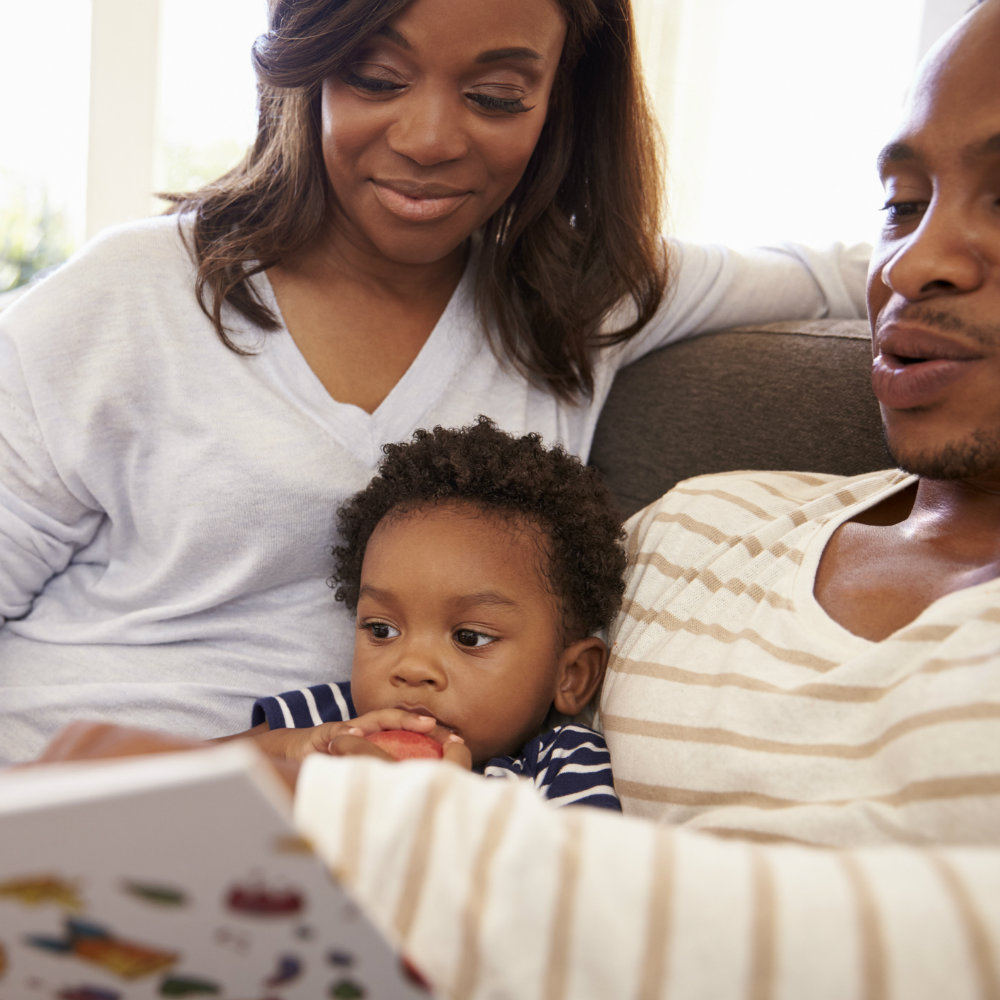
A UF psychology professor explains which features brand a book a adept choice for shared reading with babies based on her direct feel with infants in a laboratory setting.
For baby's brain to benefit, read the right books at the correct time
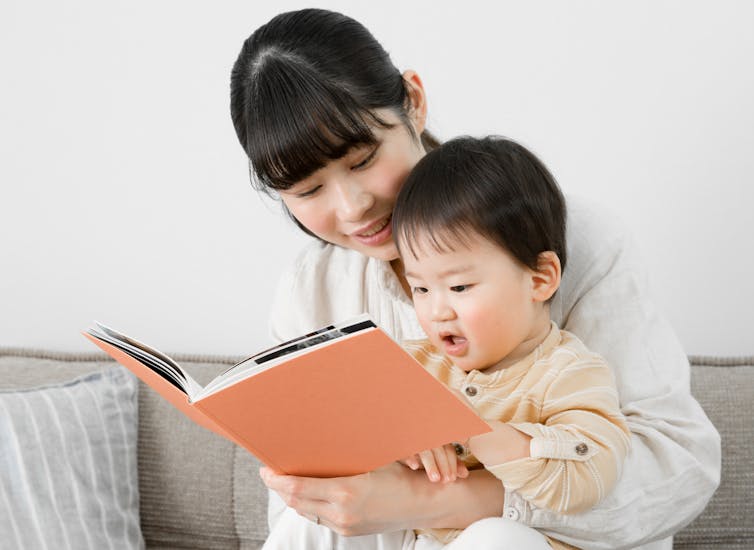
Lisa South. Scott, University of Florida
Parents often receive books at pediatric checkups via programs similar Reach Out and Read and hear from a diverseness of health professionals and educators that reading to their kids is critical for supporting development.
The pro-reading message is getting through to parents, who recognize that information technology's an important habit. A summary written report past Child Trends, for case, suggests 55 percent of iii- to five-year-one-time children were read to every day in 2007. According to the U.S. Department of Education, 83 percent of three- to five-yr-old children were read to three or more than times per week by a family unit member in 2012.
What this always-present advice to read with infants doesn't necessarily brand articulate, though, is that what'south on the pages may be just as important as the book-reading experience itself. Are all books created equal when information technology comes to early shared-book reading? Does it affair what y'all option to read? And are the best books for babies dissimilar than the best books for toddlers?
In order to guide parents on how to create a loftier-quality volume-reading experience for their infants, my psychology research lab has conducted a series of baby learning studies. One of our goals is to better understand the extent to which shared book reading is important for encephalon and behavioral development.
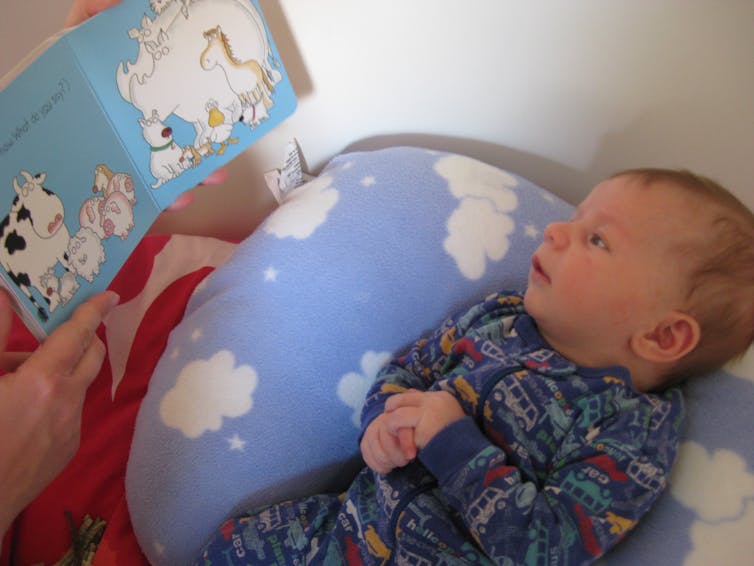
What's on baby'southward bookshelf
Researchers see clear benefits of shared book reading for child development. Shared book reading with immature children is practiced for language and cognitive development, increasing vocabulary and pre-reading skills and honing conceptual evolution.
Shared book reading also likely enhances the quality of the parent-baby relationship past encouraging reciprocal interactions – the back-and-forth dance between parents and infants. Certainly non least of all, information technology gives infants and parents a consistent daily time to cuddle.
Contempo research has institute that both the quality and quantity of shared book reading in infancy predicted later childhood vocabulary, reading skills and name writing ability. In other words, the more books parents read, and the more time they'd spent reading, the greater the developmental benefits in their 4-year-quondam children.
This of import finding is one of the outset to measure out the benefit of shared book reading starting early in infancy. Only at that place's yet more to figure out well-nigh whether some books might naturally lead to higher-quality interactions and increased learning.
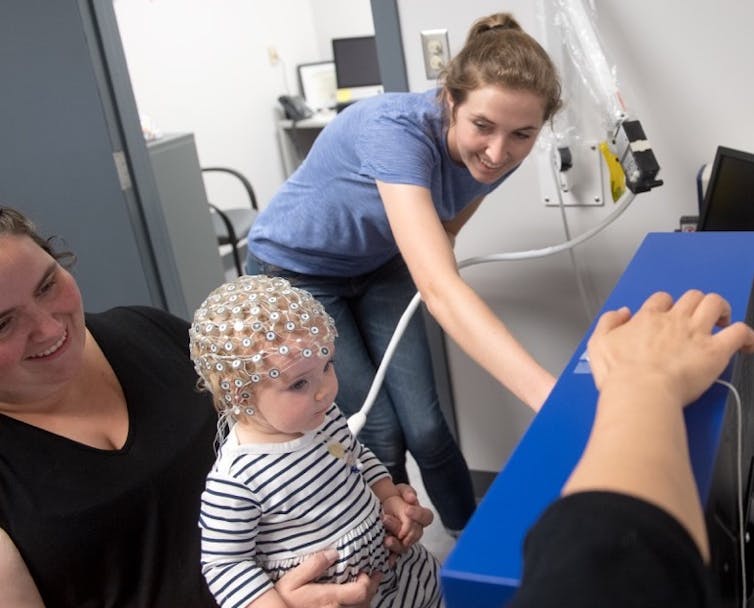
Babies and books in the lab
In our investigations, my colleagues and I followed infants across the second six months of life. We've found that when parents showed babies books with faces or objects that were individually named, they learn more than, generalize what they larn to new situations and bear witness more specialized brain responses. This is in contrast to books with no labels or books with the same generic label under each image in the book. Early learning in infancy was also associated with benefits 4 years later in babyhood.
Our well-nigh contempo add-on to this series of studies was funded by the National Science Foundation and just published in the periodical Child Development. Here's what we did.
Beginning, we brought half dozen-month-erstwhile infants into our lab, where nosotros could see how much attention they paid to story characters they'd never seen before. We used electroencephalography (EEG) to measure their encephalon responses. Infants wear a cap-like net of 128 sensors that let us record the electricity naturally emitted from the scalp as the encephalon works. We measured these neural responses while infants looked at and paid attention to pictures on a computer screen. These brain measurements can tell us about what infants know and whether they tin tell the difference between the characters nosotros show them.
We also tracked the infants' gaze using eye-tracking engineering science to encounter what parts of the characters they focused on and how long they paid attention.
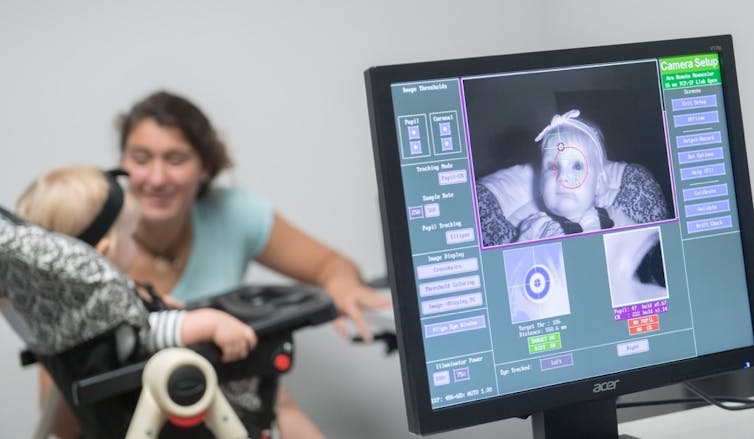
The data we collected at this start visit to our lab served as a baseline. We wanted to compare their initial measurements with future measurements nosotros'd accept, afterward we sent them home with storybooks featuring these same characters.

We divided up our volunteers into three groups. One grouping of parents read their infants storybooks that contained six individually named characters that they'd never seen before. Another group were given the same storybooks but instead of individually naming the characters, a generic and made-upward characterization was used to refer to all the characters (such as "Hitchel"). Finally, we had a tertiary comparison group of infants whose parents didn't read them anything special for the report.
After iii months passed, the families returned to our lab so we could over again measure the infants' attention to our storybook characters. Information technology turned out that only those who received books with individually labeled characters showed enhanced attention compared to their before visit. And the brain action of babies who learned individual labels as well showed that they could distinguish betwixt different individual characters. Nosotros didn't see these effects for infants in the comparison group or for infants who received books with generic labels.
These findings suggest that very young infants are able to utilise labels to learn about the world around them and that shared book reading is an effective tool for supporting evolution in the first year of life.
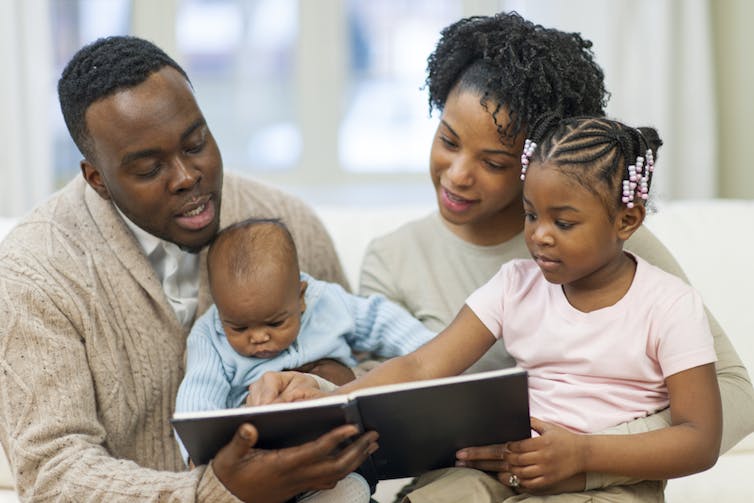
Tailoring book picks for maximum effect
So what do our results from the lab mean for parents who desire to maximize the benefits of storytime?
Not all books are created equal. The books that parents should read to six- and nine-calendar month-olds will probable exist dissimilar than those they read to ii-yr-olds, which will likely be unlike than those appropriate for four-year-olds who are getting ready to read on their own. In other words, to reap the benefits of shared volume reading during infancy, nosotros need to be reading our little ones the right books at the correct time.
For infants, finding books that proper noun different characters may atomic number 82 to higher-quality shared book reading experiences and upshot in the learning and brain evolution benefits we discover in our studies. All infants are unique, and then parents should endeavor to notice books that involvement their baby.
My own girl loved the "Pat the Bunny" books, likewise as stories well-nigh animals, similar "Honey Zoo." If names weren't in the book, we simply made them up.
![]() Information technology's possible that books that include named characters simply increase the amount of parent talking. Nosotros know that talking to babies is important for their evolution. And so parents of infants: Add shared book reading to your daily routines and proper name the characters in the books you read. Talk to your babies early and frequently to guide them through their amazing new world – and let storytime help.
Information technology's possible that books that include named characters simply increase the amount of parent talking. Nosotros know that talking to babies is important for their evolution. And so parents of infants: Add shared book reading to your daily routines and proper name the characters in the books you read. Talk to your babies early and frequently to guide them through their amazing new world – and let storytime help.
Lisa S. Scott, Associate Professor in Psychology, University of Florida
This commodity was originally published on The Conversation. Read the original article.
Source: https://news.ufl.edu/articles/2017/12/for-babys-brain-to-benefit-read-the-right-books-at-the-right-time.html
0 Response to "Dr. Lisa Scott for Baby's Brain to Benefit, Read the Right Books at the Right Time"
Post a Comment